
Take off your glasses to see what’s ahead: Schwab Impact 2024
This week Jody was on site at one of the investment industry’s most important conferences of the year. As she did for the 2023 Schwab IMPACT conference, she filed two reports—below in reverse chronological order—in between meetings with the media, conference sessions and Exhibit Hall browsing.
At the end of a long Thursday
An atmospheric river cancelled or caused extreme delays for many of us as we attempted to return home from IMPACT, held this year in San Francisco. The added travel time provided an opportunity to reflect on a few more observations about the annual confab of the RIA industry.
A delightful conversation with 401kWire’s Sean Hanna was a trip down memory lane to the first time I attended the conference back in the 1990s. At that time it was dominated by the asset managers that had products on Schwab’s No Transaction Fee platform and the advisors who came to talk to them. The agenda included mostly panels on investment topics, and star portfolio managers captured main stage spots.
Today’s IMPACT is dominated by practice management sessions with speakers helping RIAs build their business and better understand their clients…combined with a huge infomercial on how Schwab can help them do it. While a good number of asset managers still show up to connect with advisors and support an important channel partner, new innovative service providers now dominate the Exhibit Hall. Offered services include retiree insurance consulting (great to see our friend Drew Schockley from Move Health), advisor M&A (I said hello to our old friend Tina Hohman with MarshBerry), plus all the cyber, trust, compliance and communications support serving the industry.
Almost as good as Pink in concert
You can always expect a mainstage dynamo speaker and Daniel Pink did not disappoint. I listened to Pink’s book The Power of Regret a few months ago and was reminded of his powerful message that regret plays an important role in helping us avoid mistakes in the future. “We should look at regrets and use them as a signal. What we do with what we learn can be transformative.”
At IMPACT, Pink encouraged advisors to explore regrets to better understand and serve their clients. “Regrets are important to understand as they tell us something. When people tell you what they regret the most, they tell you what they value the most.”
As an aside, Pink is a masterful speaker, and I was fascinated by his excellent and minimalist use of slides to support his talk. Pink clearly agreed with my colleague Ben Bishop’s “one thought per slide” mantra. Each slide helped the listener and advanced Pink’s delightful story telling. He had the entire audience fully engaged.
Claude may see a big wave of new advisor users
Bloomberg’s Carol Masser moderated a closing day panel discussion of three AI thought leaders including Wharton professor of Entrepreneurship Ethan Mollick, AI entrepreneur Allie Miller and Founder of the MIT Project on Technology, the Economy and National Security David Edelman.
Mollick began the session with a 20-minute live demonstration of Chat GPT4 including an AI-created avatar of Mollick himself. The panelists encouraged advisors to use AI tools as private, personal assistants to accelerate their work and thinking. Miller said, “While it will be wrong 20%-30% of the time and you need to check it, it will 2x to 10x your output.”
Edelman agreed, “It is like an Ivy League intern that is articulate and full of it. You need to coach it to better help you.”
“We are seeing a 40% improvement in quality of work and speed by those using Chat GPT4,” according to Mollick. “These effects are seen over and over in studies.”
All noted that these tools can help advisors by being their thought partner. Miller suggested advisors describe a course of action and ask an AI tool to give you 50 more options. Then ask, “Here’s my thesis, are there any legal or operational issues I haven’t thought of.” Follow up with “What are five ways this could go wrong? What am I missing? Or what does success look like?”
Mullick challenged the advisors in the room: “This is real, and it can have an impact on you now. For God’s sake, just start using it!” Edelman agreed, “What skill do you not have? Do you want to be more creative? It is capable of tutoring you in a way that is not uncomfortable. You can build skills.”
SWAG highlights
A closing day tour of the Exhibit Hall to find the best swag and unburden the weary booth staff was productive. Kudos to the creativity of the marketing pros seeking to hook advisors in new and unique ways. My favorites:
Chicago Clearing: You can never go wrong with snack-sized food emblazoned with your logo that advisors (and PR pros) can stash in their bag for the plane ride home. Chicago Clearing smartly chose Garrett’s popcorn mix, and their supply was almost exhausted by the time I snagged my bag. [Editor’s note: Garrett’s popcorn is a consistent winner with our president and founder—she commented on the very same giveaway in last year’s report.]
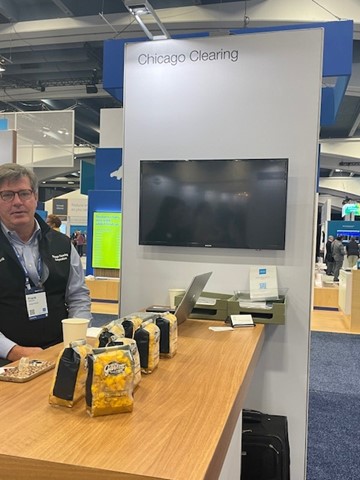
Direxion: I’m a sucker for tourist magnets from destinations I’ve visited, and this set of three colorful magnets, including the Golden Gate Bridge, were a great find. Bonus points for the yummy See’s Candies sucker!
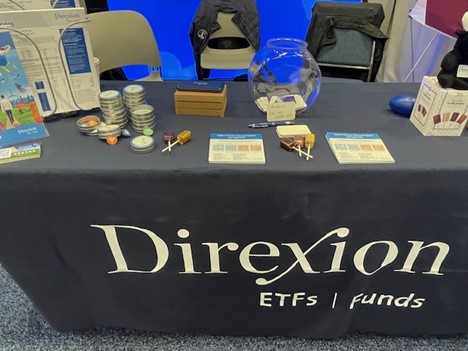
Wealth.com: I’m not sure if they gave away the cool Tiffany blue Nike Sneaks/Dunks, but I snagged a long-sleeved black workout shirt that will be great for the gym. Glad to market your brand with this excellent gear!
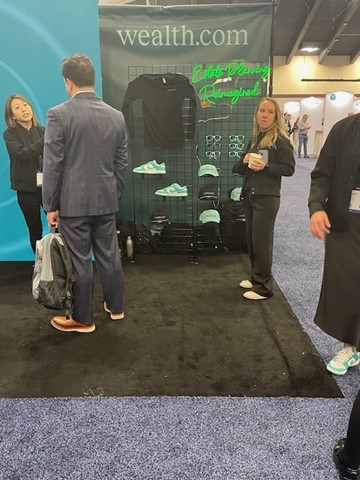
Ariel Investments: While the cosmetic bags seemed to be slow movers, Ariel’s super soft and colorful tortoises were a step up from the plush toys offered at other booths.
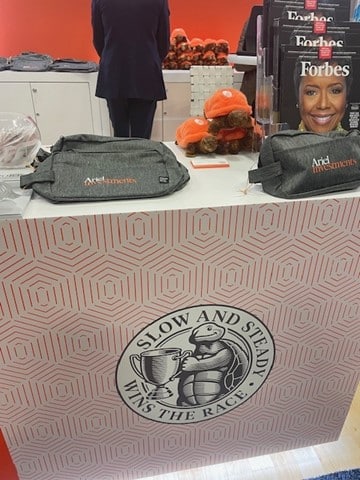
Orion: Looking for added flavor? The small jars of my favorite Mike’s Hot Honey were the perfect take home size.
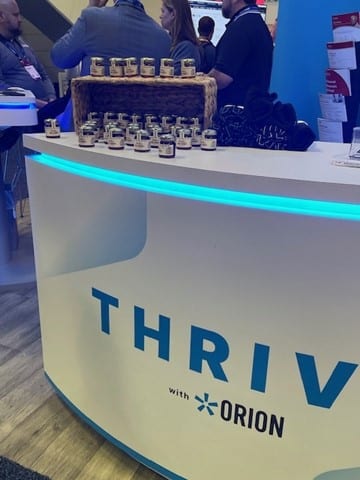
Voyant: Love these colorful socks featuring the icons from Voyant’s advisor planning software were a cozy grab given the cold and dreary weather in San Francisco.
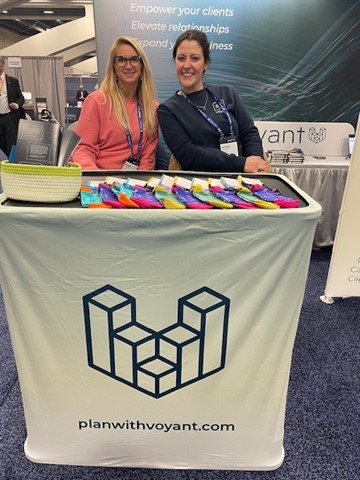
MarshBerry: West Coast time meant being wide awake at 4 a.m. and evening events that felt like they started at bedtime. Good call to help those who were dragging a bit to share Liquid IV!
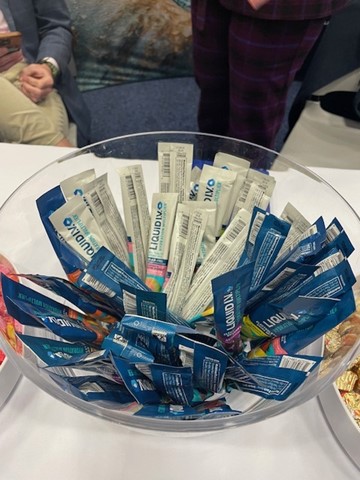
Day 1 sets the tone
Day 1 of Schwab Impact 2024 opened to high energy as the endless Exhibit Hall filled with the fiduciary RIAs who flock to this conference each year.
The opening session began with a pep rally led by Head of Advisor Services Jon Beatty to warm up the advisors who have driven a big part of Schwab’s dramatic growth to more than $10 trillion in client assets. Beatty encouraged advisors to think differently about the future where he anticipates so much opportunity. “We look at the future through the lens of today’s glasses. Take the glasses off. You have to remove today’s glasses to see clearly what is ahead.”
Beatty was followed by a touching fireside chat with outgoing CEO Walt Bettinger and Dr. Suzanne Peterson focusing on leadership. Bettinger’s humility was obvious as he talked about his own journey. He pointed to leadership traits he believes are important in those around him including constituency awareness, the ability to recognize that you might say the same thing to a variety of people, but each will hear what you say through their own experience.
Bettinger implemented something called “Brutally Honest Reports (BHRs),” asking senior leaders to report to him what is broken and what isn’t working well. He noted, “There are two major threats to leaders: People telling you what you want to hear or being afraid to tell you what you need to hear.”
The opening session concluded with a panel discussion with several Schwab strategists ably moderated by Senior Investment Strategist Kevin Gordon and including Chief Fixed Income Strategist Kathy Jones, Chief Global Investment Strategist Jeffrey Kleintop, Chief Investment Strategist Liz Ann Sonders, and Legislative and Regulatory Affairs Director Michael Townsend.
The discussion started with Townsend on the recent election. The three policy changes he’s watching most closely include taxes, the debt ceiling and tariffs. A tax bill is likely in early 2025 to address the scheduled expiration of the 2017 tax cuts. He noted it is an open question what will happen with campaign promises to cut taxes on tips, Social Security, overtime, and make auto loan interest deductible. He believes many Republicans in Congress will balk.
With the narrow margins in Congress, Townsend believes the debt ceiling fight will be contentious. He noted inflationary expectations around tariffs and that he doesn’t believe Trump will be able to put all of the tariffs in place that he promised.
Kleintop discussed tariffs in more detail to show that the impact is far from clear. He cited an IMF study of the impact of an across-the-board 10% tariff and found that it shaved a modest 0.1% off global GDP. He anticipates the impact of tariffs to be milder than headlines suggest.
Sonders picked up on the tariff topic and noted it is hard to argue against tariffs being inflationary. She then noted Trump’s immigration proposals and the impact on labor cost as well as any threats to Fed independence. “Look at the impact of all of these and we could see a huge surge in inflation.”
Sonders was also asked about what sectors might do well under the new administration and honestly answered, “I have no idea. Be careful extrapolating around what will come about.” She looked back at market-related headlines in 2016 that suggested a sector theme of traditional energy and avoidance of emerging markets, noting we are seeing the same headlines now.
In fact, just the opposite happened with energy underperforming and international doing OK in the early days of the Trump administration. The lesson is to be careful investing on political noise.
On interest rates, Jones noted that we’ll likely have to wait on the original path to cut rates. The Fed will need to wait to see the inflation numbers and dial back the number of cuts. “We are projecting the terminal rate is likely to be 3.5%, not the 2.75% we were originally forecasting.”
Subscribe.
Receive the latest news and insights from Lowe Group.